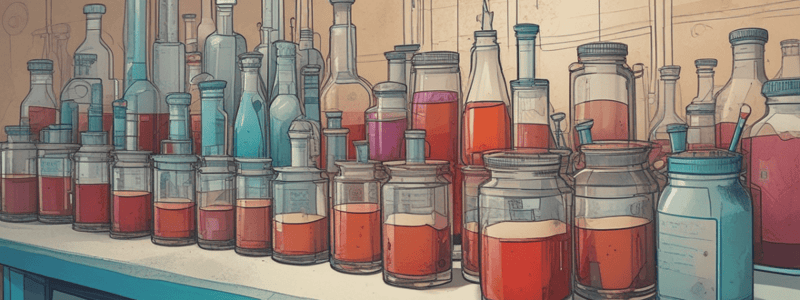Podcast
Questions and Answers
What is the primary objective of understanding the variety of laboratory samples?
What is the primary objective of understanding the variety of laboratory samples?
- To appreciate the complexity of medical conditions (correct)
- To learn about the different types of non-blood samples
- To understand the importance of sound practices in phlebotomy
- To understand the importance of blood samples only
What is the greatest percentage of laboratory samples?
What is the greatest percentage of laboratory samples?
- Urine samples
- Non-blood samples
- Semen samples
- Blood samples (correct)
Why are special handling and care required for non-blood samples?
Why are special handling and care required for non-blood samples?
- Based on the clinical condition or disease of the patient (correct)
- Because they are easily repeatable
- Due to their large volume
- Because they are highly infectious
Which of the following non-blood samples is an example of a routine sample?
Which of the following non-blood samples is an example of a routine sample?
Why is it important to handle all samples as having the potential to transmit infection or disease?
Why is it important to handle all samples as having the potential to transmit infection or disease?
What is a unique characteristic of non-blood samples compared to blood samples?
What is a unique characteristic of non-blood samples compared to blood samples?
Which of the following non-blood samples is not an example of a fluid sample?
Which of the following non-blood samples is not an example of a fluid sample?
Why are results from non-blood samples extremely important?
Why are results from non-blood samples extremely important?
Flashcards are hidden until you start studying
Study Notes
Phlebotomy and Laboratory Samples
- Laboratory samples can be of many different types, with blood samples being the most common.
- Non-blood samples can be a frequent part of almost all referral forms.
Importance of Non-Blood Samples in Phlebotomy
- Anyone in phlebotomy needs to understand common non-blood samples as they relate to phlebotomy.
- Non-blood samples may be the only type of sample required from a patient.
Varieties of Non-Blood Samples
- Many different types of non-blood samples exist, based on the clinical condition or disease of the patient.
- They require special handling and care.
- Examples of non-blood samples include:
- Urine samples (MSU, random, first morning, 24hr)
- Sputum samples (MCS/AFB)
- Stool samples (OBR/OCP/MCS)
- Semen samples (analysis, M/C/S)
- Swabs (all types)
- Histological/cytological specimens
- PUS, exudates, fluids (synovial, pleural, CSF)
Important Points to Note
- All samples must be handled as having the potential to transmit infection/disease.
- Non-blood samples require additional care, as repeat samples are not always easily obtainable.
- Many non-blood samples can be highly infectious.
- Results from these samples can provide extremely important information (life or death).
Studying That Suits You
Use AI to generate personalized quizzes and flashcards to suit your learning preferences.




